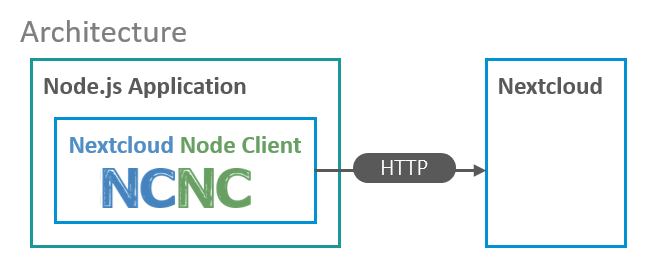Package Exports
- nextcloud-node-client
This package does not declare an exports field, so the exports above have been automatically detected and optimized by JSPM instead. If any package subpath is missing, it is recommended to post an issue to the original package (nextcloud-node-client) to support the "exports" field. If that is not possible, create a JSPM override to customize the exports field for this package.
Readme
nextcloud-node-client

Access nextcloud remotely from node.js applications with a rich and simple TypeScript/JavaScript API.
The nextcloud node client supports folder and file operations including tagging and comments. User management, event subscription and event handling is on the roadmap.
Example
// typescript
import Client, { File, Folder, Tag, } from "nextcloud-node-client";
(async () => {
try {
// create a new client using connectivity information from environment
const client = new Client();
// create a folder structure if not available
const folder: Folder = await client.createFolder("folder/subfolder");
// create file within the folder
const file: File = await folder.createFile("myFile.txt", Buffer.from("My file content"));
// add a tag to the file and create the tag if not existing
await file.addTag("MyTag");
// add a comment to the file
await file.addComment("myComment");
// get the file content
const content: Buffer = await file.getContent();
// delete the folder including the file
await folder.delete();
} catch (e) {
// some error handling
console.log(e);
}
})();Documentation
Installation
npm install nextcloud-node-client
Security and access management
The client requires the WebDAV url of the nextcloud server and the credentials.
Use an app specific password generated in the security - devices & sessions section of the nextcloud settings.
Environment
Credentials can be specified in the environment:
NEXTCLOUD_USERNAME= "<your user name>"
NEXTCLOUD_PASSWORD = "<your password>"
NEXTCLOUD_URL= "https://<your nextcloud host>/remote.php/webdav"The cloud service configuration VCAP_SERVICES can be used alternativley (refer to the Cloud Foundry documentation for details).
The nextcloud credentials are stored in the section for user provided services user-provided.
The client is able to access the service credentials by providing the instance name.
{
"user-provided": [
{
"credentials": {
"password": "<your password>",
"url": "https://<your nextcloud host>/remote.php/webdav",
"username": "<your user name>"
},
"name": "<your service instance name>"
}
]
}Creating a client
Creating a nextcloud client
// uses the environment to initialize
import Client from "nextcloud-node-client";
const client = new Client(); // uses explicite credentials
import Client, { Server } from "nextcloud-node-client";
const server: Server = new Server(
{ basicAuth:
{ password: "<your password>",
username: "<your user name>",
},
url: "https://<your nextcloud host>/remote.php/webdav",
});
const client = new Client(server);Concepts
The client comes with an object oriented API to access the APIs of nextcloud. The following object types are supported:
Client
The client is the root object and represents the connection to the nextcloud server. The client is used to get access to the root folder and the tag repository.
Folder
The folder is the representation of a nextcloud folder. It may contain many files. All files of a folder are deleted, if the folder is deleted.
File
The file is the representation of a nextcloud file. Every file is contained in a folder.
Tag
Tags are used to filter for file and folders. Tags can be created and assigned to files or folders.
API
This is an overview of the client API. Details can be found in the API docs
Client
- factory method for client
- create folder
- get folder
- create file
- get file
- create tag*
- get tags, by name, by id
- get quota
Folder
- get name, id, base name, URL
- delete
- create sub folders
- get sub folder
- create file
- get files
- get tags, add tag, remove tag
- add comment
- get comments
- move/rename
File
- get name, id, base name, URL
- get content
- delete
- get tags, add tag, remove tag
- add comment
- get comments
- move/rename
Tag
- get name, id
- delete*
* admin permissions required
API Examples
Quota
const q: IQuota = await client.getQuota();
// { used: 479244777, available: 10278950773 }Sytem information
const si: ISystemInfo = await client.getSystemInfo(); Create folder
// create folder
const folder: Folder = await client.createFolder("/products/brooms");
// create subfolder
const subfolder: Folder = await folder.createSubFolder("soft brooms");
// "/products/brooms/soft brooms"
Get folder(s)
// get folder
const folder: Folder = await client.getFolder("/products");
// get subfolders
const subfolders: Folder[] = await folder.getSubFolders(); Delete folder
// get folder
const folder: Folder = await client.getFolder("/products");
await folder.delete();Create file
const folder = await client.getFolder("/products");
const file = folder.createFile("MyFile.txt", new Buffer("My new file"));Get file
const file = await client.getFile("/products/MyFile.txt");
// or
const folder = await client.getFolder("/products");
const file = await folder.getFile("MyFile.txt");
// file: name, baseName, lastmod, size, mimeGet file content
const file = await client.getFile("/products/MyFile.txt");
const buffer = await file.getContent();Get file Url
const file = await client.getFile("/products/MyFile.txt");
const url = await file.getUrl();Add tag to file
const file = await client.getFile("/products/MyFile.txt");
await file.addTag("myTag");Delete file
const file = await client.getFile("/products/MyFile.txt");
await file.delete();Get files
const folder = await client.getFolder("/products");
const files = await folder.getFiles();Move and/or rename file
const file = await client.getFile("/products/MyFile.txt");
await file.move("/products/brooms/MyFileRenamed.txt");Create, change and delete a share
const file = await client.getFile("/products/MyFile.txt");
// share the file (works also for folder)
const createShare: ICreateShare = { fileSystemElement: file };
const share: Share = await client.createShare(createShare);
await share.setPassword("some password");
await share.setNote("some note\nnew line");
await share.setExpiration(new Date(2020, 11, 5));
await share.delete();Architecture
The nextcloud node client can be used by node applications to extend the nextcloud functionality remotely. The client uses only HTTP apis of nextcloud for access.

Quality
Tested with nextcloud 17.0.1, 18.0.0
License
Apache

